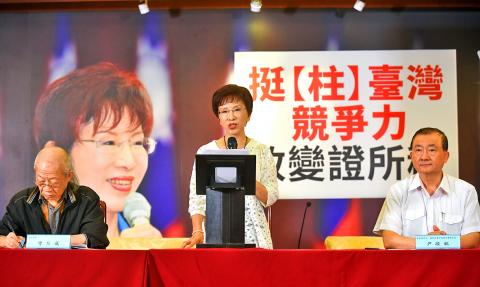Chinese Nationalist Party (KMT) presidential candidate Hung Hsiu-chu (洪秀柱) yesterday launched her second major economic policy, targeting reform of securities transaction and capital gains taxes, which have for years been fiercely debated.
Securities transactions are taxed at 0.3 percent, while traders who sell more than NT$1 billion (US$30.6 million) of local shares a year were to face additional taxes, due to a policy imposed in December last year, but which was put off for three years.
Hung said at a news conference in Taipei that her policy would divide the 0.3 percent securities transaction tax into two parts: a 0.25 percent securities transaction tax and a 0.05 percent capital gains tax, with no extra charges for “big traders.”

Photo: Chien Jung-fong, Taipei Times
Also to be reformed is the “implementation of tax justice,” scrapping different treatment for Taiwanese and foreign stock investors, with the latter currently not taxed on capital gains, she added.
Former minister of economic affairs Yiin Chii-ming (尹啟銘), speaking on behalf of the National Policy Foundation, a KMT think tank, said the proposed policy would allow active stock traders to choose, before investing, to pay either a 15 percent tax on stock gains or a 0.05 percent tax on transactions, on top of the 0.25 percent securities transaction tax.
Yiin said the proposed policy would bring no change to the overall 0.3 percent tax, while implementation and procedures would be much less complicated than a proposal by the Democratic Progressive Party (DPP) designed by former minister of finance Lin Chuan (林全).
With its 0.3 percent securities transaction tax and 0.1 percent capital gains tax, and the possibility of having to seek refunds in certain cases, the DPP’s proposal would not only constitute a financial burden to traders, but also a procedural one, Yiin said.
KMT Legislator Tseng Chu-wei (曾巨威), a retired finance professor nicknamed “the cannon of tax reform” who has raised numerous issues with the KMT caucus on bills concerning tax, said the point of controversy over securities transaction taxes “has always been a dispute over whether it should include a capital gains tax.”
“[Hung’s version] would put this dispute to rest,” Tseng said.
“It is a new framework and a new opportunity for Taiwan to initiate tax reform,” he added.
“It returns the right to choose how to be taxed to investors — whether to be taxed on transactions or to haggle with the government over the gains to be taxed — which is different from the existing scenario in which it is the government and interest groups that have the say in the levying of capital gains taxes,” Tseng said.
Hung said the policy would be pushed in the next legislative plenary session, which is to start next month, rather than waiting until her possible presidency.
“The economy cannot afford to wait,” she said.
At a separate news conference later yesterday, the KMT caucus endorsed the proposal, affirming that the caucus would take legislative action over the matter in the next session.
Elsewhere, Lin said that Hung’s proposal would be tantamount to canceling all the reforms made and abandoning capital gains taxation.
It is a proposal that would “regress too much” and would not help fatten the state coffer, Lin said.
There is no upside for tax revenues in Hung’s proposal, which is in fact a compromise, Lin added.

Taipei has once again made it to the top 100 in Oxford Economics’ Global Cities Index 2025 report, moving up five places from last year to 60. The annual index, which was published last month, evaluated 1,000 of the most populated metropolises based on five indices — economics, human capital, quality of life, environment and governance. New York maintained its top spot this year, placing first in the economics index thanks to the strength of its vibrant financial industry and economic stability. Taipei ranked 263rd in economics, 44th in human capital, 15th in quality of life, 284th for environment and 75th in governance,

The Sports Administration yesterday demanded an apology from the national table tennis association for barring 17-year-old Yeh Yi-tian (葉伊恬) from competing in the upcoming World Table Tennis (WTT) United States Smash tournament in Las Vegas this July. The sports agency said in a statement that the Chinese Taipei Table Tennis Association (CTTTA) must explain to the public why it withdrew Yeh from the WTT tournament in Las Vegas. The sports agency said it contacted the association to express its disapproval of the decision-making process after receiving a complaint from Yeh’s coach, Chuang

Control Yuan Secretary-General Lee Chun-yi (李俊俋) tendered his resignation last night, admitting that he had misused a government vehicle, as reported by media. His resignation was immediately accepted by the Control Yuan. In a statement explaining why he had resigned, Lee apologized for using a Control Yuan vehicle to transport his dog to a pet grooming salon on May 20. The issue first came to light late last month, when TVBS News reported that Lee had instructed his driver to take the dog to the salon. The news channel broadcast photos that it said were taken by an unnamed whistle-blower, which purportedly showed the

A former officer in China’s People’s Liberation Army (PLA) who witnessed the aftermath of the 1989 Tiananmen Square massacre has warned that Taiwan could face a similar fate if China attempts to unify the country by force. Li Xiaoming (李曉明), who was deployed to Beijing as a junior officer during the crackdown, said Taiwanese people should study the massacre carefully, because it offers a glimpse of what Beijing is willing to do to suppress dissent. “What happened in Tiananmen Square could happen in Taiwan too,” Li told CNA in a May 22 interview, ahead of the massacre’s 36th anniversary. “If Taiwanese students or